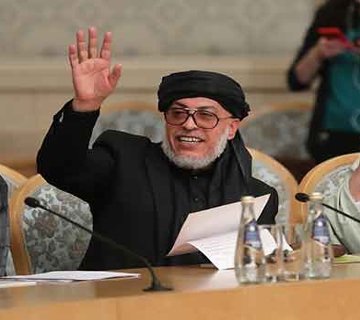- About
- Topics
- Picks
- Audio
- Story
- In-Depth
- Opinion
- News
- Donate
- Signup for our newsletterOur Editors' Best Picks.Send
Read, Debate: Engage.
| located: | Afghanistan, USA, Qatar |
|---|---|
| editor: | Shadi Khan Saif |
Though in a very primary phase of the process, the fast-track talks between the U.S. and the Taliban – taking place behind closed doors in Qatar –have sent a shockwave across Afghanistan.
Emerging details from these talks indicate that the U.S. has given a green light to the Taliban on the exit of troops in return for a promise that Afghanistan will not be used as a bastion for international terrorism. The Taliban, in response, are rightly claiming to secure this initial deal on their terms, as the Trump administration seems to be in an unexpected rush to withdraw troops from the country. The Kabul government has suddenly felt abandoned, and the Afghan people in a strange sense of déjà vu, with memories of the bloody past coming back to haunt them.
By excluding Kabul in these talks and kneeling to the Taliban – considering the Afghan government as the illegitimate puppet of the U.S. occupation – Washington has delegitimised the government in its claims of support. This can be seen as a hallmark Trump manoeuvre of betrayal, partly inspired by domestic politics in the U.S. itself, with no regard to the fragile state of affairs in Afghanistan. But, what is on stake here are the lives and future of a nation that has been having a relative peace for the past few years, amid decades of war and meddling by its neighbours.
It is true that the U.S. has invested immensely in Afghanistan, in both blood and fortune. But that is why it should not rush to exit without caring for its own efforts of facilitating new life to the country, particularly at this election year. Following the 9/11 attacks, the then U.S. President George Bush declared that the leadership of Al-Qaeda has great influence in Afghanistan and supports the Taliban regime in controlling most of the country. He claimed that in Afghanistan there is a vision of Al-Qaeda's for the world. After nearly 18 years of international engagement, more than 50 percent of the country is no longer Al-Qaeda’s vision for the world, but the areas under the control of the Taliban still are.
If the nascent and fragile Kabul government is left on its own, will the Taliban – with the backing of regional countries – not support and harbour international terrorists? Clearly, the Afghans should eventually take the responsibility of running their country in their own hands, come to terms with the followers of diverse political ideas peacefully in the country, and be able to protect its borders from powerful neighbours.
What its international backers, particularly the U.S. can do in the meantime is to streamline and slow-down the exit plan of troops while profoundly assuring long-term support to the proud nation on the frontline against the war on terrorism.
